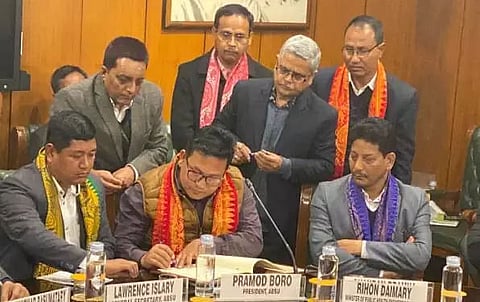
- Home
- Live Blog
- Breaking News
- Top Headlines
- Cities
- NE News
- Sentinel Media
- Sports
- Education
- Jobs

The issue of land rights in Bodoland Territorial Region (BTR) has become a major plank for all political parties in the December 7 and 10 elections to the Bodoland Territorial Council (BTC). The intractability of the land question in the BTR has kept it alive as an electoral issue and the answer may get lost in poll promises if they lack the correct understanding of the problem. The parties need to be cautious in pushing the issue too far without a clear roadmap of addressing it. The Bodoland People's Front, which ruled the BTC for three consecutive terms since its inception, has promised land rights to indigenous communities in BTR. The United People's Party Liberal (UPPL) has promised a new land policy to protect the land rights of the non-Bodos as well as the non-tribals, and the Bharatiya Janata Party (BJP) has promised equal land rights to all communities. However, the three parties missing the opportunity of pushing for it during the finalisation of the third Bodo Accord left room for speculations over implementation of their poll promises, if elected to power. The BTR Accord provided an opportunity to address the issue which was overlooked as a non-issue from the perspective of aspirations of the Bodo people.
The second Bodo Accord which paved the creation of the BTC as a territorial council under the amended provisions of the Sixth Schedule of the Constitution mentions about the land rights of non-tribal people living in areas under the jurisdiction of the tribal autonomous council. The Clause 4.3 of the second Bodo Accord signed in 2003 deals with the question of the safeguards for the "settlement rights, transfer and inheritance of property etc. of non-tribal people." It promises that any such law as may be made by the BTC in this regards will not, in particular, extinguish the rights and privileges enjoyed by any citizen of India in respect of his land at the commencement of the BTC, and bar any citizen from acquiring land either by way of inheritance, allotment, settlement or by way of transfer if such citizens were eligible for such bonafide acquisition of land within the BTC area. The Accord also states that the amendments to the Sixth Schedule shall include provisions in such a manner that the non-tribals are not disadvantaged in relation to the rights enjoyed by them at the commencement of BTC and their rights and privileges including land rights are fully protected. The third Bodo Accord signed on January 27 this year is only an extension of the BTC accord and the core clauses of the previous Accord including the clause on land rights of non-tribal have been left untouched. The new accord, however, has the provision of exclusion of the non-tribal majority villages on the BTR boundary and inclusion of the contiguous tribal-majority villages outside of it in the BTR.
The Assam government has already set up a boundary commission to receive representations on exclusion and inclusion of villages and make recommendations accordingly. The non-tribal villages with less than 50 per cent Scheduled Tribe (ST) population in core area of the BTR which were included in the erstwhile BTAD for contiguity of ST-majority villages will continue to remain in BTR. The issue of land rights of non-tribal people in BTR, therefore, will always remain and will return as an electoral issue till apprehension among the non-tribal people of losing their land rights is addressed once for all. The right over land of the non-tribal people has been protected by the Bodo Accord. Complexities in transfer of land by the non-tribals in BTR have arisen due to protection of land under Tribal Belt and Blocks. The tribal belt and blocks were created to protect land of tribal people and non-tribal people are not allowed to sell or transfer land in these protected areas. Any land transfer to non-notified class of people in the tribal belt and block is illegal and transfer of land in these protected areas to a person belonging to the notified classes of people or a permanent resident requires prior permission from the Deputy Commissioner. Legal complexities arising out of the protection of land rights for notified classes of people in tribal belt and blocks pose a stumbling block to implementation of the Clause 4. 3 of the BTC accord. Such complexities have made land issue in BTR not only complicated but also sensitive. Consequences of any irresponsible statement over the land issue in BTR has the dangerous potential to open old wounds of decades of bloodbath during violent ethnic conflict and internal displacement of lakhs of people. The resolution of the long pending issue which is also a major cause behind such conflicts and displacement is critical to permanent peace in BTR. It will require consensus among all communities. The parties in BTR can surely ensure bring a consensus but will need the determination not to shy away from the complexities.